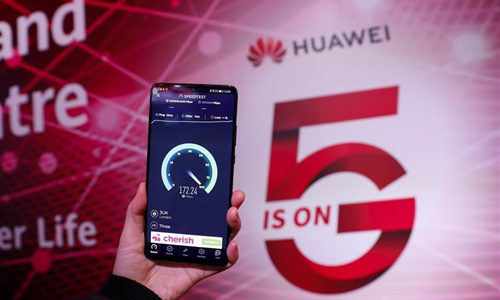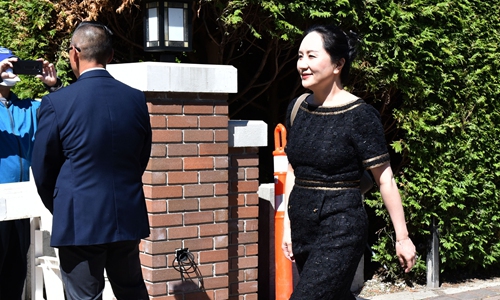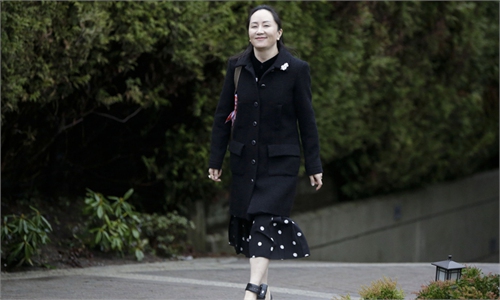
File photo taken on Jan. 28, 2020 shows a Huawei 5G mobile phone testing speed in Huawei 5G Innovation and Experience Center in London, Britain. Huawei is "focused on keeping Britain connected" and that is "the biggest contribution we can make" to its national effort against the COVID-19 pandemic, said Huawei's Vice President Victor Zhang in an open letter released on April 13, 2020. Photo:Xinhua
Huawei's semiconductor chips subsidiary is hiring global genius amid a US chip ban, a move that experts said is a well-planned counter to US bullying that shows the company's confidence in becoming self-sufficient in chips supply in about two years.Huawei's chip design company HiSilicon announced that it is recruiting talented young people from around the world, and offering competitive salaries and positions, according to media reports. The recruitment targets the world's outstanding post-graduate and doctoral students who have graduated or will graduate from January 1, 2017 to December 31, 2021.
This recruitment program shows that Huawei is expanding its talent base and preparing to expand the scope of research and development, which shows its confidence to the outside world, Ma Jihua, a veteran industry analyst, told the Global Times on Monday.
"In the future, Huawei may face rising attack from the US, which will force it to expand its recruitment of talent to expand its scope of research and development," Ma said.
The US' latest move to restrict Huawei comes after Washington made a rule change that would require foreign manufacturers using US chipmaking equipment to get a license before being able to sell semiconductors to Huawei.
As the China-US technology battle continues to heat up, the US Semiconductor Industry Association is seeking $37 billion in federal funding for factory construction and research, according to media reports.
To shield its operations from the US crackdowns, Huawei has stockpiled up to two years' worth of crucial chips, according to the Nikkei Asian Review. The stockpile shows that Huawei is confident of upgrading its manufacturing ability within two years, experts said.
"In two years, the problems facing Huawei could be eventually solved. It may be able to diversify its supply chain as China is stepping up the construction of its own semiconductor foundry sector. Technology will also be upgraded to a relatively large degree within two years," Ma said.
When Huawei itself has the ability to manufacture and produce its own chips, the US will gradually lift the ban on Huawei, as the ban is also a blow to the American chip industry, experts said.
If the US really strangles Huawei, its own industry will also suffer greatly, Xiang Ligang, a veteran industry analyst, told the Global Times on Monday.
"For US semiconductor companies, Huawei is a very big customer. If they do not sell to Huawei, they will face huge losses. The ban will also force European and Japanese companies to think twice before they build factories in the US. Some local US companies may move outside the US to find a way to sell to Huawei," Xiang said.
"The chip industry is a highly globalized industry, and it is difficult for anyone to suppress another party completely," he noted.



